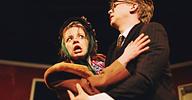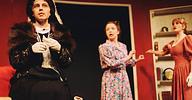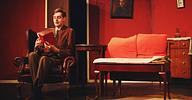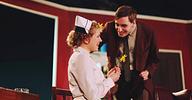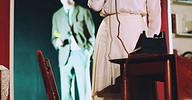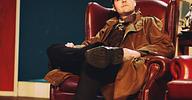Harvey
A timeless comedy about a man, a rabbit, and what it means to be different.
Cast and Crew
- Assistant Producer
- Catriona Oliver
- Assistant Producer
- Katya Moncrieff
- Assistant Producer
- Sally Pendleton
- Betty Chumley
- Rachel Bussom
- Director
- Henry Conklin
- Director
- Lauren Moreau
- Duane Wilson
- Martin Maclennan
- E.J. Lofgren
- Ian Culleton
- Elwood P. Dowd
- Craig Methven
- Judge Omar Gaffney
- Eric Geistfeld
- Lighting Designer
- Tom Turner
- Lyman Sanderson
- Macleod Stephen
- Miss Johnson
- Louise Spence
- Mrs Ethel Chauvenet
- Ella Rogers
- Myrtle Mae Simmons
- Emily Deans
- Producer
- Fergus Deery
- Publicity Design
- Louise Spence
- Ruth Kelly
- Elsa Van Der Wal
- Stage Manager
- Julia Brown
- Stage Manager
- Rosamund Fitzmaurice
- Technical Manager
- Katherine Bull
- Veta L. Simmons
- Caroline Elms
- William Chumley
- Callum O'dwyer
Reviews
★ ★ ★ ★
The High expectations turned into sheer anxiety as the lights dimmed on the audience and the performance commenced. Disregarding expectations was impossible, knowing that the play has its roots in a Pulitzer Prize winning novel and has run globally for seventy years.
In hindsight, holding expectations was not a smart move due to it being a play where the central character Elwood P. Dowd (Craig Methven) has a 6-foot-3-and-a-1/2 inch tall invisible rabbit named Harvey for a best friend.
Regardless of its high reputation, the production satisfied in every regard. It is neatly woven together with particularly strong performances from Methven, Caroline Elms (as Elwood’s sister, Veta) and Callum O’Dwyer assuming the role of Dr. William Chumley, a psychiatrist who attempts to have Elwood permanently committed to a psychiatric hospital.
While Harvey never makes an appearance on stage, his presence is heavily focussed on, effectively conveying the company of a giant white rabbit to the viewer. Doors are seen to open independently, and Elwood even apologises at one point for kicking him accidentally. Elwood’s discussion of Harvey’s friendly and talkative nature not only helps to personify Harvey, but also establish Elwood’s firm beliefs in Harvey’s existence.
Sophistication is also apparent in the handling of the stage, with Veta’s living room looking distinctly average – reflecting her desperate attempts at properness and normality despite Elwood’s sometimes disruptive behaviour. Conversely, the bland and spacious furnishings of the hospital work to convey a sense of staleness and emptiness.
The occasional interjections of period musical numbers firmly contextualise the performance in 1940s America. Effective attempts at period immersion also include references to proper manners towards women, temperance, and misdiagnosis and treatment of suspected mental illnesses.
The performance conveys a strong message of acceptance and forgiveness. The serious yet light-hearted theme along with the strong performances and technical sophistication mean that you won’t be left feeling disappointed by any stretch of the imagination.The High expectations turned into sheer anxiety as the lights dimmed on the audience and the performance commenced. Disregarding expectations was impossible, knowing that the play has its roots in a Pulitzer Prize winning novel and has run globally for seventy years.
In hindsight, holding expectations was not a smart move due to it being a play where the central character Elwood P. Dowd (Craig Methven) has a 6-foot-3-and-a-1/2 inch tall invisible rabbit named Harvey for a best friend.
Regardless of its high reputation, the production satisfied in every regard. It is neatly woven together with particularly strong performances from Methven, Caroline Elms (as Elwood’s sister, Veta) and Callum O’Dwyer assuming the role of Dr. William Chumley, a psychiatrist who attempts to have Elwood permanently committed to a psychiatric hospital.
While Harvey never makes an appearance on stage, his presence is heavily focussed on, effectively conveying the company of a giant white rabbit to the viewer. Doors are seen to open independently, and Elwood even apologises at one point for kicking him accidentally. Elwood’s discussion of Harvey’s friendly and talkative nature not only helps to personify Harvey, but also establish Elwood’s firm beliefs in Harvey’s existence.
Sophistication is also apparent in the handling of the stage, with Veta’s living room looking distinctly average – reflecting her desperate attempts at properness and normality despite Elwood’s sometimes disruptive behaviour. Conversely, the bland and spacious furnishings of the hospital work to convey a sense of staleness and emptiness.
The occasional interjections of period musical numbers firmly contextualise the performance in 1940s America. Effective attempts at period immersion also include references to proper manners towards women, temperance, and misdiagnosis and treatment of suspected mental illnesses.
The performance conveys a strong message of acceptance and forgiveness. The serious yet light-hearted theme along with the strong performances and technical sophistication mean that you won’t be left feeling disappointed by any stretch of the imagination.
Our rabbit, Toffee, died of a heart attack when the builders came in. Harvey, however, lives; for Harvey is immortal, a stage and movie legend, and stands 6ft 3½ins high. It would be nice to see him leaning against the gates of Pollock Halls, in the Bristo Bar. You can see him, sort of, in Bedlam until Saturday. When he’s not on stage he’ll probably be out back in the Whisky Snug of the Hotel du Vin.
Harvey does not do selfies, as (i) they’re dime-store cheap and (ii) he’s invisible anyway, give or take his hat and coat. This pooka, avatar, rabbit has ineffable presence just as his companion, Elwood P. Dowd (47) has matchless, gentle, manners.
Craig Methven plays Elwood and is great at it. It is not just the faultless accent – Elwood and Harvey are from Denver, Colorado – but intonation, timing, gesture; all convincing. And the look! A beanpole with trousers just too short, jacket sleeves just too short, a trilby perched on top. A complete oddball with a smiling front of teeth that Oral-B would pay top dollar for. When Elwood says “Doctor I’ve wrestled with reality for 40 years and I’m happy to say that I’ve finally won out over it”, you cheer. You love him when, to save his sister from a life of nerve-shredding collapse (hilarious, by the way), he is prepared to take a mind-bending drug and forsake Harvey: “Say goodbye to the old fellow, would you?” Weep at it.
Psychology and psychiatry butt against comic form. It’s not One Flew Over the Cuckoo’s Nest meets Peter Rabbit but it’s there in the wacky sanatorium where Doctors Sanderson, handsome, (Stephen Macleod), and Chumley, crumpled, (Callum O’Dwyer) mess up. Pretty Nurse Kelly (Elsa van der Wal) is stuck in-between them with only the near lunatic, knuckle-dragging Charge Nurse Wilson (Martin Maclennan) for support. Chumley takes to his own couch and fantasises about Akron, a silent young woman – not Mrs Chumley (Rachel Bussum) – beneath maple trees and cold beer. Elwood, bless him, counsels whisky and – progressive fella – that the lady be allowed to talk.
It is, with Harvey about, still a richly comic and US neighbourhood. A cab driver (Ian Culleton) dispenses philosophy and Judge Omar Gaffney (Eric Geistfeld) drawls his speech back to Louisiana. You might find Harvey at Charley’s Place on 12th and Main, or at the 4th Ave. Fire House, or at Blondie’s Chicken Inn or even in the grain elevator but it is at the Dowd residence at 343 Temple Drive that the comedy is really at home. Veta and Myrtle Mae are Elwood’s older sister and niece respectively. Their situation is becoming impossible and Veta (Caroline Elms) is beside herself, which in psychiatric terms is problematic. Elms goes for it in a Mid-West/ Mitteleuropäische speak which is as funny as it is fluent. Her outrage after an unfortunate and naked session in the sanatorium’s Hydrotub is an object lesson in how to put the flounce into speech. Meanwhile, Myrtle Mae (Emily Deans), lipstick forward, responds ardently to any suggestion of ‘sexual urges’.
For some private, delightful, reason, Elwood likes the phrase ‘the evening wore on’ – preferably in bars, I guess. Directors Henry Conklin and Lauren Moreau prove that Mary Chase’s play can still put time aside and put charm in its place. Okay, the lighting cues are ragged and the nurse for doctor crush is dodgy, but there’s Glen Miller and Sinatra on the soundtrack and a fine oil painting of Harvey and Elwood above the fireplace.
Gallery
[ssba]
Spotted an error? Email us at archive@friendsofbedlam.co.uk and let us know.

